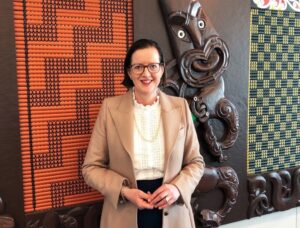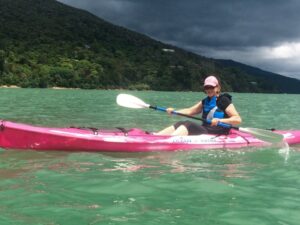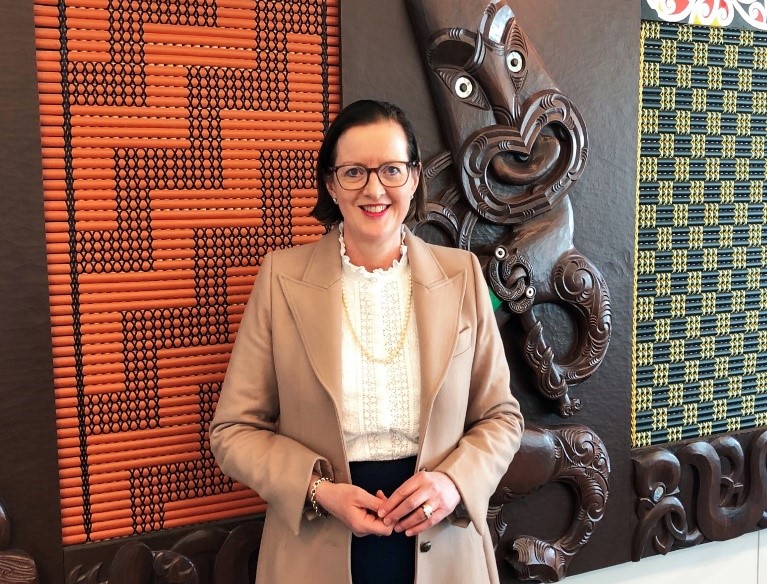 Suva, Fiji, October 22 October 2021– Christine Stevenson is the Comptroller and Chief Executive of New Zealand Customs Service (NZ Customs), which is the country’s oldest government department. Ms. Stevenson has had a long career in the public sector and has worked for the Ministry of Social Development, Ministry of Justice and the Department of Corrections, and took up her current position about the same time the COVID-19 virus reached New Zealand. The pandemic has kept her busy but on rare days when she has free time, you may catch her hiking, kayaking or even fishing.
Suva, Fiji, October 22 October 2021– Christine Stevenson is the Comptroller and Chief Executive of New Zealand Customs Service (NZ Customs), which is the country’s oldest government department. Ms. Stevenson has had a long career in the public sector and has worked for the Ministry of Social Development, Ministry of Justice and the Department of Corrections, and took up her current position about the same time the COVID-19 virus reached New Zealand. The pandemic has kept her busy but on rare days when she has free time, you may catch her hiking, kayaking or even fishing.
What is the best part of your job, being Comptroller of NZ Customs?
There are several reasons, if I may. The first is that I get to work with the wonderful people at NZ Customs who work tirelessly every day to protect New Zealand from things like: drug incursions, weapons smuggling, and child exploitation materials. They also support and promote New Zealand businesses through mutual recognition agreements. Of course like every Customs administration and the OCO, that traditional work has continued over the last year, while we have also been dealing with COVID-19. I am thankful and grateful every day to our people who do a phenomenal job. We also have a very strong collegial relationship with other Customs administrations across the world, particularly across the Pacific. We always find a great deal of common ground with Customs administrations that we work with and I think this sort of cooperation between global Customs administrations is unique.
What is your vision for NZ Customs Service?
We aspire to eliminate border and revenue risk and our purpose statement is that “we are here to protect and promote New Zealand across borders”. Most of the people who work for NZ Customs spend much or all of their career with us, they are enormously loyal, very experienced, and knowledgeable. When we asked them why they work for Customs, they said four key values really resonate with them: Te Ara Tika – we do what is right, Katiakitanga – we are guardians, He Tāngata – we value people and Pae Tawhiti – we look forward.
How has COVID-19 impacted NZ Customs Service?
We have been impacted in a variety of ways and I am sure this is true for all other OCO member countries. All our frontline staff who work at the airports and maritime ports must be vaccinated as this is mandatory and required by the New Zealand Government. I am thankful that around 96 per cent of our frontline staff were prepared to be vaccinated. Those who were not prepared to be were re-deployed to non-frontline work. Regrettably we had a few roles in some parts of New Zealand where deployment wasn’t necessarily possible, so eight staff left our employment because of their reluctance to be vaccinated.
At the border, the way we work has changed as we now must ensure that Personal Protection Equipment (PPE) is worn, and social distancing is observed. I am proud that since January 27 2020, when we first got our staff into PPE, we have not had a single frontline staff member become unwell with COVID-19, even though they were dealing with international travelers, who may have COVID-19, on a daily basis.
We have also had challenges of supply chain disruptions, which I think all OCO members are experiencing. The disruptions have really hurt our exporters and importers, and we are working very hard with these sectors to ensure that we keep their goods moving across the borders as best we can. We recently chaired the APEC Sub-Committee on Customs Procedures this year as part of New Zealand’s hosting of APEC 2021. One of our focuses was ensuring that vaccines and PPE move across the APEC countries’ borders without tariff and any other intervention and interference, so I’m proud of what we were able to achieve in that space.
The Maritime Border Order (MBO), which requires a 24/7 presence on all of New Zealand’s ports was implemented last year. Prior to the pandemic, NZ Customs did have presence in major ports but now we have quite big teams at every sea port to ensure there is compliance with the MBO. This has been a significant piece of work, which we have been undertaking and I see that continuing until the middle of next year or possibly longer.
Like many countries and certainly in the Pacific, we have seen our air passenger numbers drop by 98 per cent, which was just unimaginable before COVID-19. We did enter a Quarantine-free travel arrangement with Australia earlier this year and for a period we did see an uplift in passenger numbers because of that but regrettably both Australia and New Zealand have had recent Delta variant outbreaks, so Quarantine-free travel has been suspended for the moment. However, I’m happy to say we are working on Quarantine-free travel arrangements with several Pacific countries. This is very important to us because we have close links and long-standing relationships in the Pacific. Those are a few of the things that COVID-19 has changed for us.
Apart from COVID-19, what are the other critical challenges faced by NZ Customs Service?
Every day, there are a whole raft of critical challenges. Aside from managing COVID-19 and keeping our people safe, despite the travel and trade disruptions, criminal groups are adaptive and drugs, weapons, child exploitation materials and tobacco are all still smuggled into New Zealand. We are doing all we can to stop these illicit materials from entering our country and prosecuting those responsible for these importations.
In New Zealand, we currently have a lockdown enforced in Auckland while the rest of the country is operating on a lower alert level. So, the impact of the lockdown on our staff is on my mind. Even though we have some who are permitted to go to workplaces, many are working from home, which is tough. People have to balance their responsibilities with work and their personal lives, and people miss coming into the office and seeing their colleagues. While we have done well and we have good systems and technology, it worries me that some people will become disconnected, and you see a little bit of stress and fatigue creeping in.
Our financial position is something I have had to pay a lot of attention to. Prior to COVID-19, around 67 percent of NZ Customs’ revenue was from third parties so initially the government underwrote the rest of our cost. We have the clearance levies for air and cruise passengers when they arrive in New Zealand and we have charges for goods crossing our borders. Obviously around 33 percent of our income just disappeared when we closed the border. We are having to work hard and closely with the government on how we can gradually return to financial sustainability.
Having closed our border, we must plan to reopen it again safely. NZ Customs is leading quite a lot of work on how we gradually and safely reconnect with the world. The business community has an enormous wish to open our border and there is a lot of pressure on the government to open the border. Figuring out how we can open the border safely will require a whole new level of technology and new systems, which we are starting to build. I am hoping that what we build will be good systems, which will make travel as simple as it can be in what’s going to be a more complicated world. These are various challenges, which I am sure all OCO members are trying to grapple with.
If you were not Comptroller of Customs, what would have been your ideal job?
This is my ideal job, this is my dream job. This is the job I wanted before I was given the opportunity to carry it out and it has surpassed my expectations and hopes, and I really love it. I can’t think of any other thing I’d rather be doing!

For more information, queries, or interview requests, please email MediaOCO@ocosec.org
About OCO: OCO is a grouping of 23 customs administrations in the Pacific region. It facilitates regional cooperation, information sharing and capacity building of its members with the overall target of supporting economic growth and improved border security in the Pacific.
